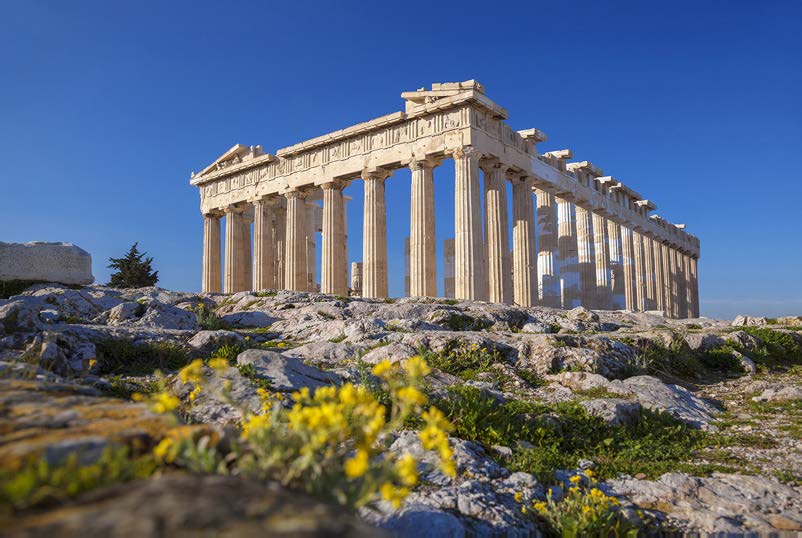
Athens, the city of intellect, is part of the Attica basin situated at the south-eastern tip of the Greek mainland. The city of Athens is the capital of Greece and it is the country’s heart as well as its economic, industrial, political and cultural centre.
With thousands of years of history and mythology under its belt, Athens, named after Athena (the goddess of wisdom), is more than just a big concrete city. Athens, known as the birthplace of democracy and founder of the main values of the so-called western civilization, is also the birthplace of the modern Olympic Games.
The City has had the honor of hosting the 2004 Olympic Games which led to major changes in the area: a new international airport, new metro lines and a new ring road around the city were constructed, while new landscaping added millions of indigenous trees and shrubs to the region. The Athens 2004 Olympic Games added a significant chapter to the history of the city, leaving behind important legacy as far as infrastructure and technology is concerned, hence putting Athens among the most hospitable metropolis of the world.
Population
According to a census held in 2021, the population of the urban area of Athens is 3.1 millions.
Language
The national language is Greek, while English and French are widely spoken. The usage of the Greek language spans three and a half millennia. The Greek language and alphabet have been the basis on which many European languages developed.
Currency
Up to December 2001, drachma was the official currency of Greece while it changed into Euro starting from January 1st, 2002.
Telephone
Athens area code 210, country code +30.
Weather
The average temperature in Athens during November is 9oC-17oC, while the average humidity is 74.3. General weather updates are available at the website of the Hellenic Meteoroloical Service: http://www.hnms.gr
System of Government
Greece is a Parliamentary Republic, established in 1974. The President of the Hellenic Republic, elected by the Parliament’s members, is the Head of State.
USEFUL INFORMATION
Visas
Visas may be required in order to enter Greece as a visitor. In such cases, you need to contact the Greek Embassy or Consulate in your country, your airline company or your travel agent well before your departure. In order to see from which countries you need a visa to enter Greece, please click here.
Electrical current
The standard in Greece is 220 V AC (50HZ). Appliances from North America require a transformer and British ones an adaptor. We recommend that you bring one along, so that you do not spend valuable time looking for adaptors and transformers during your stay.
Time
Greek time is two hours ahead of Greenwich mean time, one hour ahead of Central European time and seven ahead of Eastern standard time. Along with the rest of continental Europe, the clock is advanced one hour during summer – from the end of March to the end of September – almost a month earlier than in the UK, USA and Canada. Therefore, keep in mind that you need to add one more hour in the time difference with these countries for some weeks in April and October.
Credit cards
All major credit cards as well as euro-cheques are recognized and accepted in most hotels, shops, travel agencies and restaurants. Stickers on front windows will advise you as to which credit cards are acceptable.
Postal services
Signs denoting post offices are usually bright yellow, so are post-boxes. If you wish to send a letter there are stamp vending machines and post-boxes outside all central post offices. Many hotels provide postal service.
Health care
You should feel perfectly safe to eat and drink anything during your stay. The tap water is drinkable. The health services are of high level and you will be able to find an English-speaking doctor easily. Residents of EU countries are eligible to emergency medical care free of charge. Nevertheless, we recommend that you take out insurance policies to cover unexpected travel and medical expenses.
Emergency services
First Aid Services: 166
Duty hospitals and clinics / Pharmacies: 1434
Police: 100
Other useful phone numbers
Greek National Tourism Organization: +30 210 8707000
Tourist Police: 171 (24-hour information service line)
ATHENS THROUGH THE CENTURIES
Athens is considered the intellectual and artistic centre of Greece, a jewel of the ancient world. It is the city where mankind’s most precious and most significant moral values were founded. Philosophy, science, literature, art and drama are just some of the concepts born in ancient Athens. Democracy, freedom, justice and forward thinking are ideals conceived in this great city, ideals which are the core principles of western civilization and of today’s society. So much of Ancient Greek History took place in the city of Athens.
MYTHS & PREHISTORIC ERA
According to mythology, the Olympian goddess Athena and the Olympian god Poseidon competed over who would be the protector and patron god of the city we now know as Athens. This was to be decided based on which god gave the city the finest gift. Poseidon, the sea god, hit the Acropolis rock and created a sea water spring. Athena, who was the goddess of wisdom and knowledge, presented an olive tree. Thereinafter, the city was called Athens and the olive tree branch has become the symbol of good will and noble rivalry.
MYCENAEAN ERA & EARLY CITY FORMATION
It is believed that Athens has been inhabited since the Neolithic Period. It originally was a provincial town during the Mycenaean Era. As it gradually began to develop economically and artistically, it expanded and more tribes moved to the area. Poets and scholars began to emerge, the Acropolis became a place of worship and rhetors started to gather at the Agora, debating and arguing. Athens was slowly growing into a major city of importance.
THE GOLDEN AGE
In the 5th century BC, Athens fought the Persians, who invaded the area twice. The Athenians, who had become a great military power, won both times, once in Marathon and once in the naval battle of Salamina. The Persian War was the reason for the Greek states to unite against a common enemy, and this was a decisive point in world history. If the Greeks had been defeated, Persian culture would have prevailed. Athens’ position was greatly strengthened due to its victory over the Persians and it ultimately became the leader of the Greek world. During the 5th century, or the period otherwise known as the Golden Age of Athens, the great statesman Pericles led the city. Athens was the first democracy and the greatest of all states, giving birth to ideas and principles that had never been thought of before and which all owe their existence to this city.
In this era, Athens was also considered to be the intellectual and artistic centre of Greece. Historians Herodotus and Thucydides, and the scholars and playwrights such as Aeschylus, Sophocles, Euripides and Aristophanes, flourished. Pericles instructed sculptor Pheidias and architects Iktinos and Kallikrates to construct the Parthenon and the other buildings on the Acropolis, which still stand today as proof of the artistic, intellectual and spiritual power and excellence of the City.
MACEDONIAN ERA
In 431 BC Sparta declared war on Athens and after many years of fighting, Athens was finally defeated. The Peloponnesian War, as it was called, had weakened most of Greece, enabling Philip II of Macedonia to subdue the majority of the Greek states, including Attica. Later, Philip’s son, Alexander the Great united all of Greece’s cities-states, establishing his empire and conquered areas in Africa and Asia, spreading the Greek language and culture. During Alexander’s reign, Athens remained an intellectual center.
ROMAN ERA & BYZANTIUM
In 146 BC Greece was conquered by the Roman Army, which greatly contributed to the decline of Athens and to the loss of the city’s power and glory. Later, Christianity began to spread throughout the country. In 330, the Roman Emperor Constantine moved the capital of the Roman Empire to the former Greek colony Byzantium, and renamed it Constantinople. Thus, the Empire was split into western and eastern halves and Athens became part of the eastern Byzantine Empire, which flourished for over 1000 years. During this era, most ancient temples were converted into churches, and this is the reason why modern Athens is full of wonderful Byzantine ecclesiastical art.
MIDDLE AGES & THE OTTOMAN OCCUPATION
Unfortunately, the history of Athens in Byzantine times is one of repeated invasions, which resulted in the Empire’s eventual collapse. Throughout the Middle Ages, Athens came under the rule of other Mediterranean powers such as the Franks, the Catalans, the Florentines and the Venetians. Ultimately, the Ottoman Turks took control of Constantinople in 1456. For the next 400 years Athens, and indeed all of Greece, was occupied by the Ottoman Turks. In this era, many of the antiquities were damaged terribly, the most important being the Parthenon. The Ottoman forces had stored their gunpowder in the Parthenon, which had been converted into a mosque. Venetian mercenaries fired explosives through the roof of the temple and reduced it to ruins.
GREEK REVOLUTION & INDEPENDENCE
The Greek people finally rose up against the Ottoman Turks in 1821 and so began the Greek War of Independence. The war lasted 8 years, and in 1830 the three great powers – Britain, France and Russia – declared Greece to be a legally independent nation. In 1834, King Otto I named Athens as the capital of Greece.
WORLD WARS & THE 20th CENTURY
After WWI and the Asia Minor catastrophe, Athens changed immensely due to the exchange of populations between Greece and Turkey. Most people settled in Athens and the greater Attica region. Although the new population crowded the city and new districts needed to be developed, Athens bloomed in the cultural aspects of life.
Athens participated to a great extent in WWII. On 28 October 1940, Greece refused to open its borders to the Italians, and thus began its participation in the war. With precious little forces and arms to assist them in their battle, Greeks managed to force the Italians to retreat back into Albania. The Nazi invasion of Athens in 1941 proved to be a difficult task for the invading forces due to the rough terrain and the courageous spirit of the Greek resistance. During the eventual Nazi occupation, the population suffered greatly due to famine and hardship. Greece was finally liberated in 1944.
The next five years the country went through a cruel civil war. A few years of political tranquillity followed, until 21 April 1967, when the army took over the leadership of the country and declared military junta. The junta was overthrown in 1973 and one year later, Greece was declared a Presidential Republic. The year 1981 marked the entrance of Greece into the European Union. Since then Athens has blossomed into a modern, exciting, multifaceted European metropolis.



